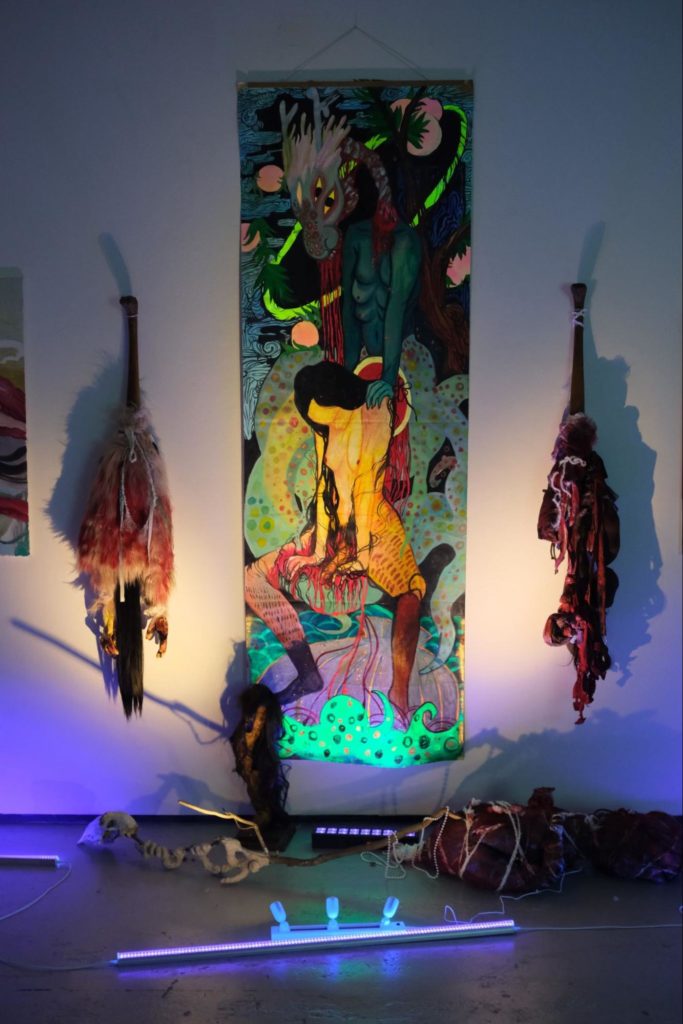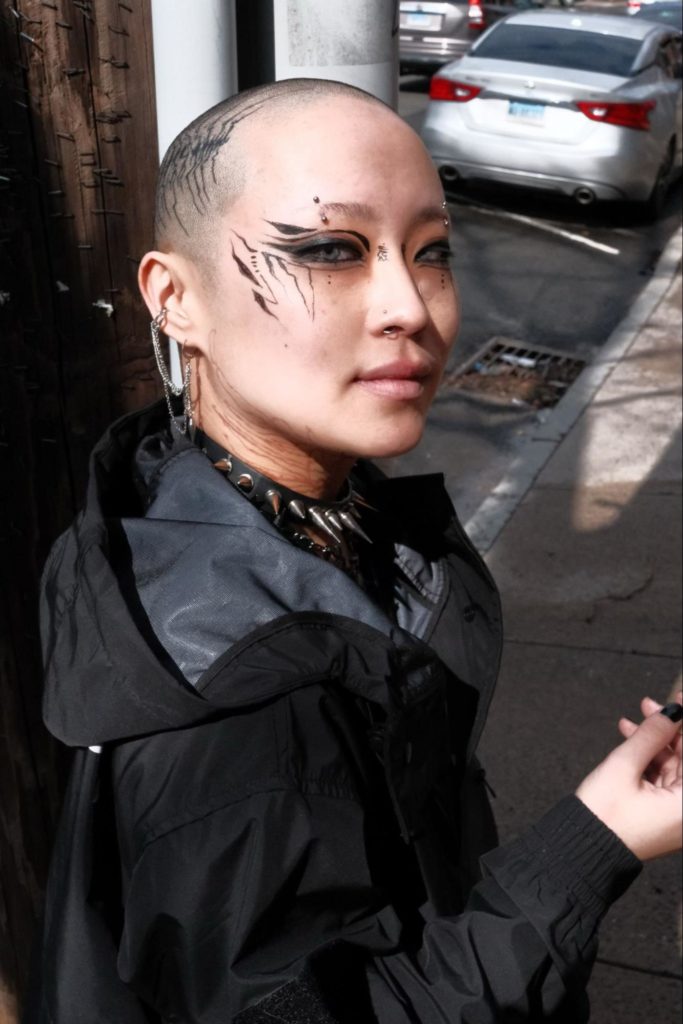COLLOQUIUM: Senior theses on Asian American issues
Graduating seniors from various disciplines dedicated their theses to Asian American issues this past academic year. Read to learn more about their projects.

Courtesy of Sunnie Liu
Cathy Duong ’22, English
Thesis Title: “Literary Parentage in Vietnamese American Literature about Paris”
Cathy wrote her English thesis on two novels, “The Committed” by Viet Thanh Nguyen and “Things We Lost to the Water” by Eric Nguyen. Both are written by Vietnamese Americans and feature Paris prominently.
“The question that I was asking that led me to these books is: Where is French colonization in Paris in Vietnamese history? People mostly think about Vietnamese history and experience as related to the Vietnam War so I was curious about accessing a deeper past that Vietnamese Americans are still affected by.”
“The Paris Eiffel Tower logo…and the French baguette [in Vietnam]… It’s kind of a symbol of how the colonized takes culture from the colonizer. Aside from that, there’s also this musical variety show that Vietnamese people are super proud of called Paris by Night.”
“At the same time, no one talks about the fact that Paris is significant because of French colonization and that there is this violence to it that is not really acknowledged. And so I was wondering, how does that factor into literature or how can I learn more about it by using literature and analyzing that?”
“What I noticed from the two books that I looked at was that they often talk about Paris and Frenchness in close connection to fathers and fatherland … and so I found this relationship that I called ‘literary parentage.’”
“The literary parentage is a father-son relationship that converges with the teacher-student relationship and this places an expectation or reliance on the father/teacher figure to pass down personal memory and knowledge to the son/student… [It’s] an imperfect relationship that often exposes what it’s lacking, what’s still left to be desired, what the son/student continues to need and what the father/teacher fails to provide.”
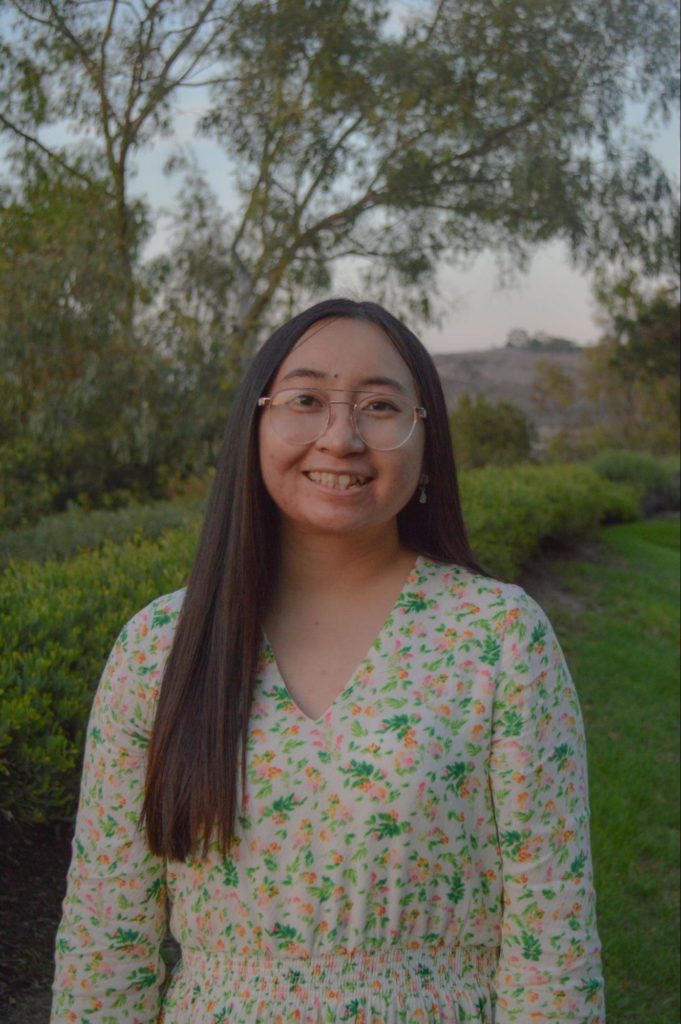
Sunnie Liu ’22, History and Art
Liu is a history and art major, and her history thesis is titled “Rocking the Boat: Vietnamese American Resistance to Racialized Violence Across the Gulf Coast.”
“My history thesis is studying Vietnamese refugee fishermen and their families and communities across the Gulf Coast from Texas to Florida, and the ways in which they experience racialized anti-Communist violence from the local white townspeople and other white fishermen as well as the KKK [in the latter half of the 20th century].”
“The most infamous case of these fishermen conflicts was in the small coastal town surrounding Houston…That’s where the KKK got involved and the Vietnamese fishermen there…ended up suing the KKK, which is how it became propelled to the national stage as a news story… But I’m more interested in not just this myopic focus on that very specific legal battle but the fact that it was part of a larger pattern of racialized anti-Communism, systemic racism, [and] issues of economic-driven xenophobia.”
“I used a lot of newspaper archives as well as data from the fishing industry, economics… and documentaries made in response to these incidents.”
Art Thesis Title: “施洗 (To Baptize)”
The figures in Liu’s art thesis represent her and her parents, and the viewer is invited to sit on the cushion seats to join them in the ceremony, she said.
“My art thesis is a mix of performance art, installation and sculpture. It’s exploring this church I grew up in as a way to critique the role of religion in colonialism and capitalism upholding those sort of oppressive structures. The church I grew up in was in Texas, and it was founded by white Texans, including Republican Texas representatives who evangelized low-income Chinese migrants…The congregation was Chinese-American while the people who founded the church were white [creating] this internal missionary project.”
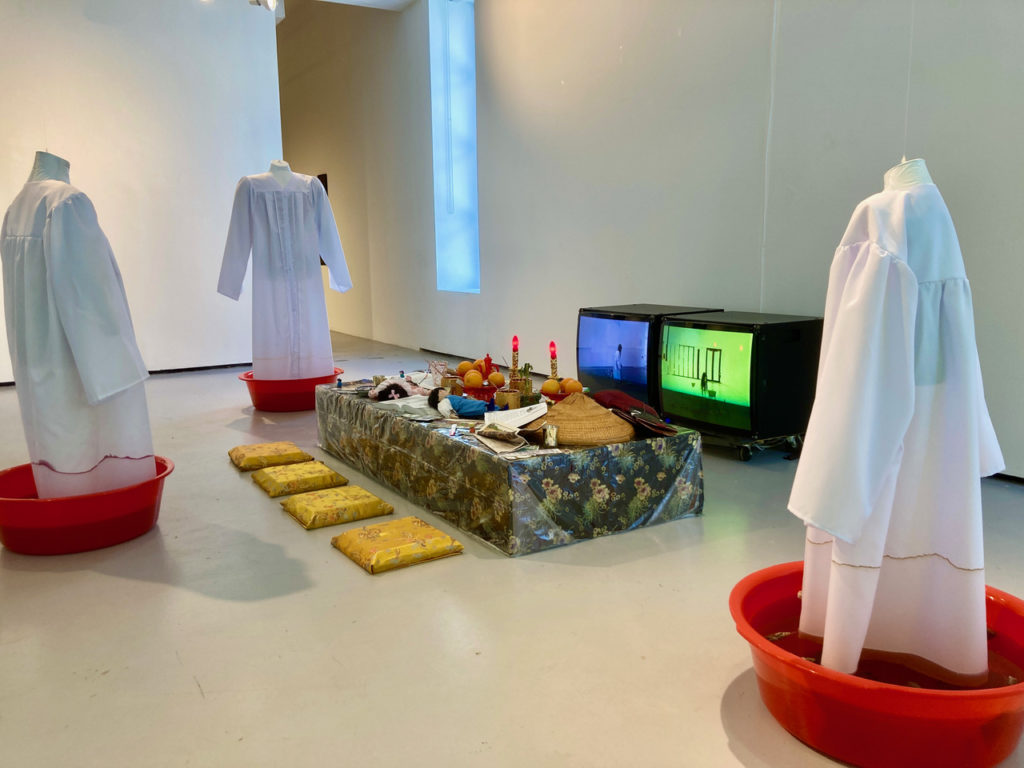
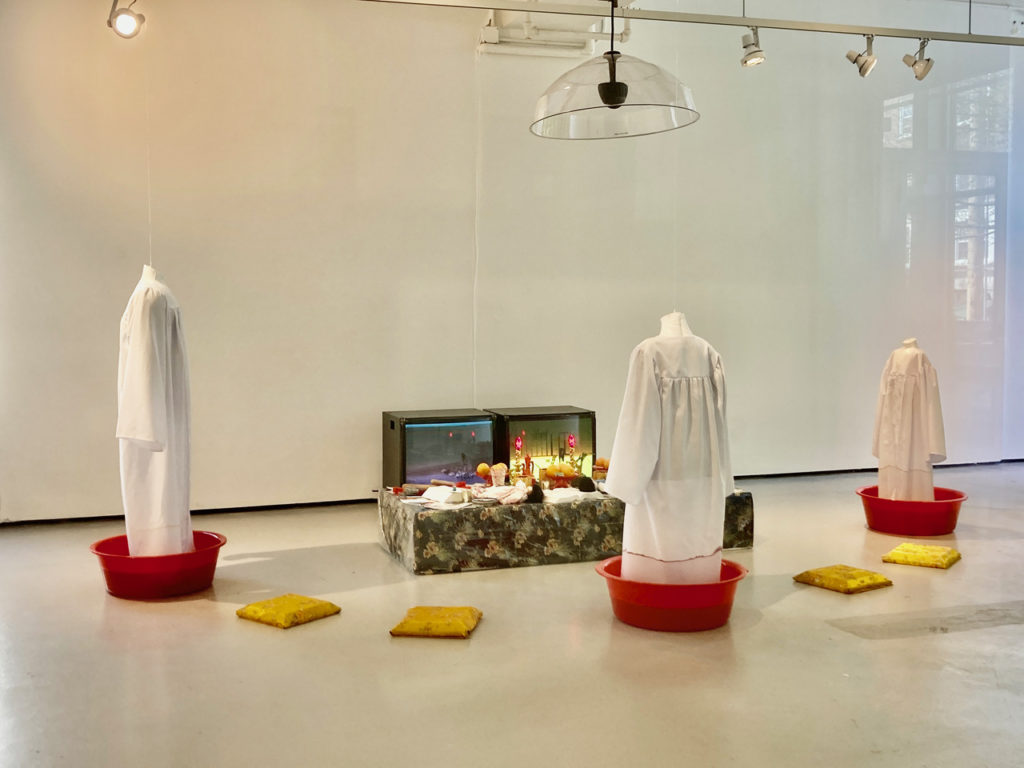

Abeyaz Amir ’22, Art
Thesis Title: “Undefeated”
“I wanted to recreate a club scene in the gallery. Club scenes interest me because I grew up in a Muslim South Asian household and while my parents were pretty lenient, I did have family members who wouldn’t take pictures or listen to music and that really conflated with my identity my outlook on my life and sexuality. And especially when I got to college, I began to seek out my own spaces. I didn’t really join clubs or societies or frats or stuff, because … especially with societies and fraternities there is a racialized aspect to it that gatekeepers a lot of especially South Asian and East Asian students. “
“My work is about all of the observations that I made throughout college and being a young adult and also studying history at Yale. The project is also about colonialism because who gets to go out at night and dance and sing with their friends and drink and do drugs? That answer is largely dictated by the outcome of history and colonialism.”
“All of the objects and figures in the mural are split up into three central desires that I have come to understand as driving colonialism, being the desire for greed, so commerce, the desire for flesh, so that’s like bodily desire, and desire for war, warfare specifically. So I picked objects throughout time, starting from the 1400s to the present day with symbols of these things, so different kinds of weapons, different kinds of drugs, different kinds of clothing items, objects like caco, tobacco, sugar, indigo, directly pointing to those specific histories. There are two mirrors of a world map that’s a eurocentrically focused world map but it has lines showing the directions of goods during colonialism and also the direction of bodies.”
“It’s also a reflection on Keith Haring and Bruce Nauman and queer artists in the 80s and 90s because we are coming to age in this sexual revolution where we understand sexuality to be an intersection of race and class. And especially as an Asian person I have to be conscious of that, going about the world. So the style is reminiscent of those artists but as a South Asian artist, I feel like I’m making a new history for queer, non-queer, for any South Asian person who is entering these westernized party spaces.”

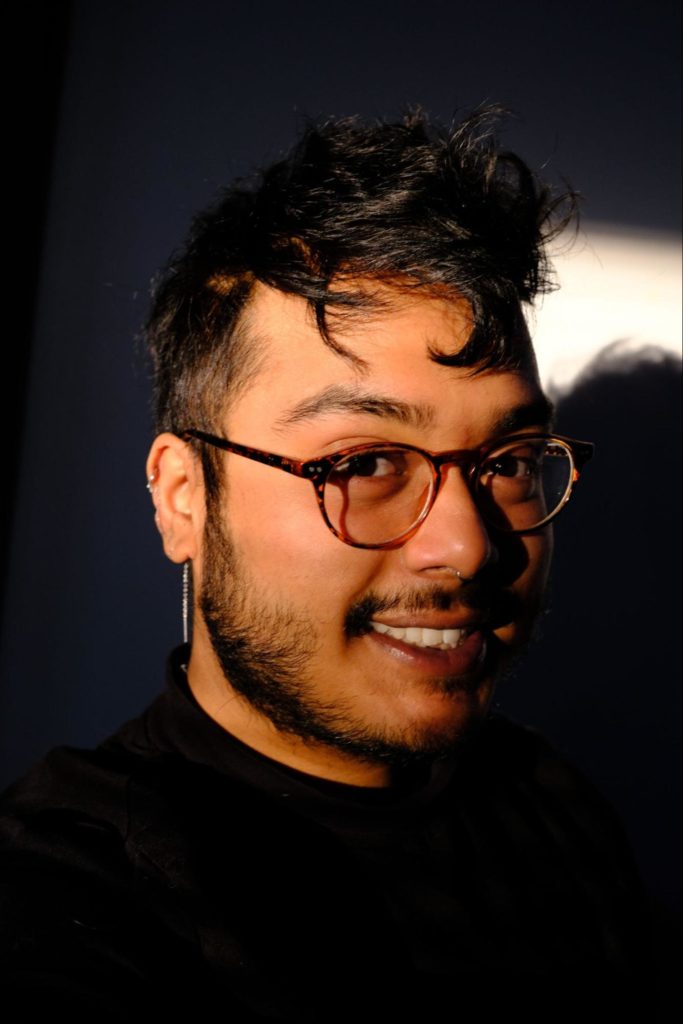
Jieun Yu ’22, Art
Thesis Title: “Dokkebi.”
“I’ve always been passionate about historical issues specifically related to Korea because I grew up there and came here relatively late [at] around 14. I’ve been painting about a lot of different things, but I do tend to draw a lot of my inspiration or stylistic references or specific topics of painting from Asian American issues or Asian issues in the homeland. They’re connected because we live in a system of post-imperialism and capitalism.”
“This thesis was about … what I felt and experienced and project as a genderqueer and queer Korean person. And what it means to have body and life and also death in a postcolonial world. I think it mostly deals with identity or like body dysmorphia or any sort of dysmorphia that comes with being objectified as queers … We’ve always been othered as the nonhumans who are incapable of experiencing and exploring our sexualities the way we traditionally have done in our homelands. And I think that’s where I drew a lot of my inspiration from for the thesis. I used a lot of Korean iconography and symbolism that I grew up with.”
“I painted a lot of bodies and queer bodies. And by queer I could mean gay or trans because I am those but also in general being Asian, being POC.”
